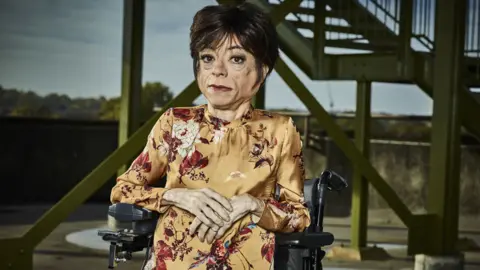Broadcasters commit to doubling disabled employees by 2020
 BBC
BBCNational broadcasters and the UK government have backed a plan to double the number of disabled people working in television by 2020.
The BBC, ITV and Sky are among those to support the initiative to increase the percentage of disabled people working on screen and behind the scenes.
The scheme comes from the Creative Diversity Network (CDN).
According to the CDN, 6.8% of people appearing on screen and 4.5% of the workforce off screen are disabled.
The figures relate to programmes broadcast between August 2016 and July 2017. They are contained in a CDN report, which says 18% of the overall UK population are disabled.
The CDN monitors inclusivity in UK broadcasting, and its Doubling Disability plan has the backing of the Department for Work and Pensions.
Behind the scenes, the numbers of people with disabilities varies by genre.
The highest proportions were in current affairs (12.1%) and children's programmes (9.3%). Lower representation was found in comedy (2.2%) and drama (1.9%), with the figures in arts and music too low to report.
Sarah Newton, minister for disabled people, said: "Doubling Disability will play an important role in ensuring that the UK's 14 million disabled people feel represented in the media, with the potential to change public perceptions of disability for the better."
BBC director general Lord Hall said: "Diversity is vital to the BBC's commitment to serve the whole of the UK. As an industry we must do more to increase the number of disabled people working in broadcasting.
"We're fully committed to the CDN's Doubling Disability plan and want to do all we can to improve representation amongst our own staff and freelancers working across the industry."

Follow us on Facebook, on Twitter @BBCNewsEnts, or on Instagram at bbcnewsents. If you have a story suggestion email [email protected].
